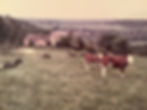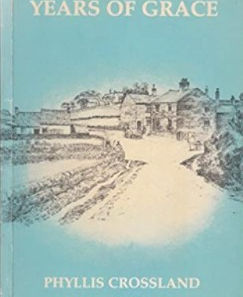
Phyllis Crossland
of Oxspring, Hunshelf Hall & Trunce
1924 - 2010

Main photograph: Trunce in 1972, taken by Julia Tomson, Phyllis's daughter
The essay below was written by Phyllis Crossland in 1999 and submitted for a Yorkshire essay competition, which she won. In fact she entered, and won, twice. She entitled this essay "life in rural Yorkshire," but the content is more specific to Hunshelf rather than Yorkshire in general.
Submitted to this website by Julia Tomson, Phyllis's daughter, who has renamed it "Poverty and Prosperity in Hunshelf."
Phyllis also wrote a manuscript History in Hunshelf, 1993, which is available in the archives of Stocksbridge Library
This recording was sent to me by Julia Tomson, and it is part of a much longer recording that her son, Will, made of her mother Phyllis Crossland's reminiscences shortly before she died in 2010. Will and his friend Danni selected this section and put it to music.
When they Dropped the Bombs, the first night of the Sheffield Blitz, 12th December 1940
Below is a poem that Julia Tomson wrote for her mum's 86th birthday and which she later adapted to read out at her funeral. It's a lovely summary of her life.
The .pdf below contains a photograph of Hunshelf Hall and five pages taken from the book "History from the Farm" by Professor W. J. Hoskins, published in 1969. Phyllis developed this piece of writing, publishing it in her booklet "History in Hunshelf." The file opens in a new window and can be downloaded or printed out.
A SHORT BIOGRAPHY OF PHYLLIS CROSSLAND by Julia Tomson
Phyllis Mary Crossland, nee Bramall, was born on May 22 1924 at Willow Farm, Oxspring, to parents Grace and Ernest Bramall. When Phyllis was three, the family moved to Coates Farm where Ernest carried on the family business of butchering. Phyllis was the eldest of five surviving siblings. She was a bright, academic girl who loved school and passed the County Minor examination to win a place at Penistone Grammar School when she was eleven.
Phyllis was particularly good at languages and had a passion for history. Her French teacher Mr “Froggie” Robinson was sure that she would win a place at Oxford University. Sadly this was not to be. While Phyllis was studying hard in the Lower Sixth, her father died of a stroke, and war broke out. Her mother gallantly kept the butchering business going by employing people, but as the eldest son, Norman, was only twelve, Phyllis felt obliged to leave school and contribute to the family’s income. Mr “Froggie” Robinson was horrified, and contacted Grace: “She’ll win a scholarship to Oxford,” he said. “You don’t have to worry about the money.” But in those days “book work” wasn’t considered to be real work and Phyllis felt guilty sitting at the kitchen table, studying, while her mother toiled away, although she wanted her daughter to carry on with her studies. So Phyllis left school at sixteen and went to Barnsley Tech. to learn shorthand and typing. The typing came in handy later when she was writing her books. After spending a year as a secretary in the offices of David Brown’s at Springvale, Phyllis became bored.
Grace saw that her daughter was unhappy and was regretting missing her only chance of going to University. However teaching was still an option and Grace suggested that Phyllis should apply – even though the training had to be paid for. After the short stint at Brown’s, Phyllis went to Darlington Teacher Training College for two years. On returning home, she worked in Sheffield before securing a position at Silkstone Common under the headmaster, Mr Kenworthy. It was at an excuse-me dance at Penistone Drill Hall where she met her husband-to-be, Charles Crossland. They were married in 1948 and went to live on the family farm at Hunshelf Hall, Greenmoor. Daughter Angela was born in 1949, Julia in 1953, and Wendy in 1964. The early part of Phyllis’ married life was spent largely doing domestic work in the farmhouse: cooking, sewing, knitting and bringing up the children. But she was also available for supply teaching as the children grew older. She spent two years from 1963-64 as a class teacher at Thurgoland School until Wendy was born and later taught at Greenmoor and Oxspring Schools.
In 1968, Phyllis produced her first piece of writing which was published in a book: “History of the Farm” by Professor W. J. Hoskins. In 1980, Charles “retired” from farming at Hunshelf and the couple moved down the valley to the smaller fifty acre holding at Trunce Farm. It was while she was researching the history of that farm that Phyllis realised that her great grandfather, Joseph Bramall, had started the butchering business there during the 1800s and that her ancestors had lived there for much of that century. It was this realisation and the research that followed that inspired Phyllis to write her family saga “Echoing Hills.” However, this book was preceded by the biography of her mother, “Years of Grace,” which was not only the story of Grace’s life, but a valuable historical record of working class rural life from the 1850s to 1980. The two editions of this book, published by Bridge Publications and the Hallamshire Press, sold out quickly. Phyllis was always aware of the passage of time and the need to record the voices of the past for posterity. In the 1980s she visited the homes of local retired service men and women with a tape recorder. This resulted in her book “On Active Service World War II,” which she published herself with the proceeds being donated to the British Legion.
During her time at the Trunce, writing in an old caravan in the croft, Phyllis was very active contributing to various journals and articles notably for all four volumes of “Aspects of Barnsley.” She was a passionate and meticulous researcher, and, before the days of the internet, she would travel far afield to public record offices at Northallerton, Wakefield, and Somerset House in London, to find documents. In 1998 Charles and Phyllis moved to the Old People’s bungalows at the Willows after Charles suffered a stroke. He died in 1999 but Phyllis continued to write and research. She resumed Latin classes, started to learn Spanish and acquired a computer which she loved using. She visited Barnsley Library Archives every Tuesday to help transcribe historical documents on microfilm.
She took a great interest in the lives of her grandchildren and encouraged them with whatever they were doing. Her mind remained young and lively until the day she died. After 2006, Phyllis’ physical health gradually declined, but she was always cheerful. She loved to sit by her living room window at “The Willows” looking over to Willow Farm where she had been born, and reminiscing about her happy childhood. She always maintained that she had been lucky in life; lucky to have been born at a time in history where she had been able to experience and enjoy the best of the old rural ways of life as a child, but as an adult to benefit from modern inventions which made life for those living in the late 20th century. Her own adult life was much easier than the drudgery experienced by her parents and their ancestors.
The weekend before she died, my sister Angela took a history magazine so she could read to Phyllis while she was in hospital. The article she was reading was about Guy Fawkes. A couple of days later Phyllis contracted pneumonia and was barely conscious when I went visit her with my daughter, Rose, that evening. I gave her a sip of water but she seemed too weak to talk. “What have you been thinking about Mum,” I asked. “Guy Fawkes,” she replied. These were her last words. No self-pity and no thoughts of mortality or immortality, no farewells – just thinking about history. So typical of mum – a historian to the last! Phyllis Mary Crossland died in December 2010. Her funeral was held at Penistone Church and she was buried at Stottercliffe Cemetery in Penistone next to her husband Charles.

Newlyweds Charles and Phyllis Crossland in 1948, on top of a wagon full of corn sheaves which is parked by the roadside at Hunshelf Hall before being led into the stack yard for stacking
NEW STORY!
The Abbotts Crucifix.
This is a story written by Phyllis just before she died. It was inspired by the ghost of the monk and the lost village village of Pennysale. In 1980, Phyllis was invited to look around Alderman's Head when it was operating as a guesthouse. It is the only existing dwelling, apart from the farm, which was part of the lost village, and Phyllis had reason to believe that it had monastic connections. This is a story aimed at older children but I loved it! The story can be read online or downloaded and printed off - it's about 40 A4 sheets of paper.
With thanks to Julia Tomson for her contributions and for sharing her late mother's work



